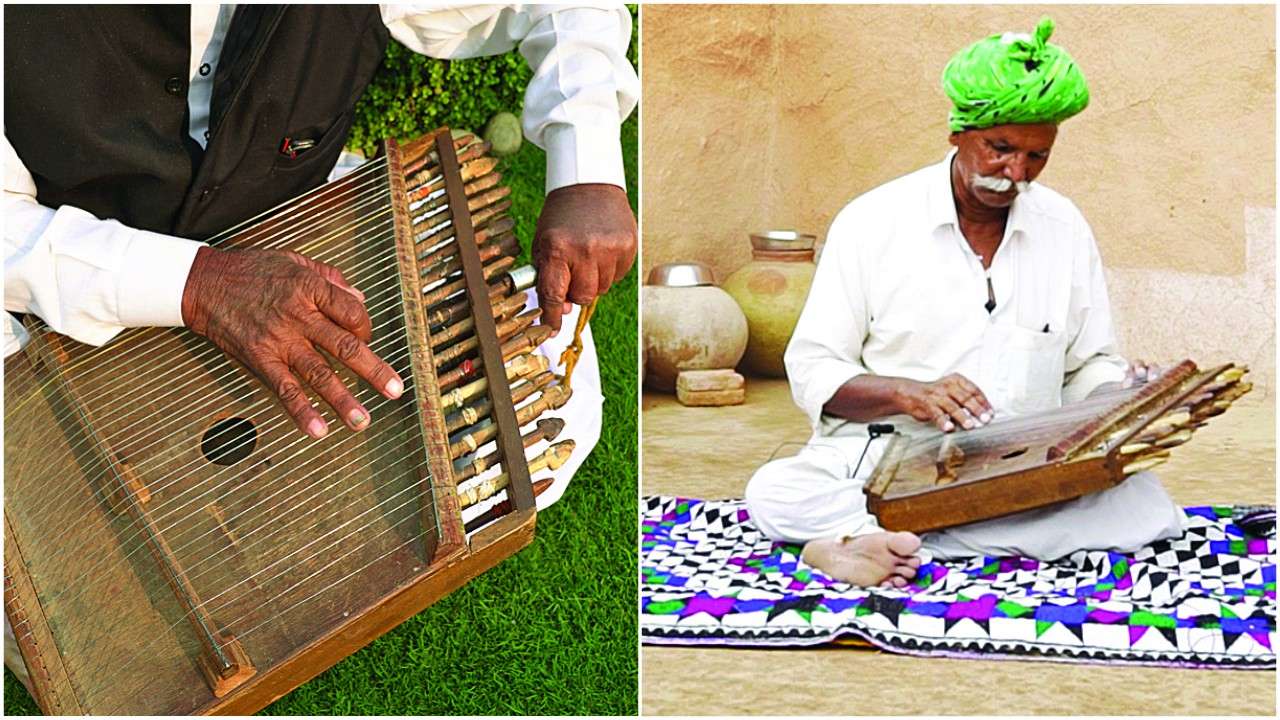
Belonging to Manganiars, a community of Muslims known for their folk music, Jaisalmer based Chanan Khan and his four generations have been performing for their patrons. They perform at weddings, melas, festivals and other auspicious occasions across the region. In a recently held travel conference in Delhi, Khan performed along with his three sons. They sang bhajans and folklore from the region and paired them with their traditional instruments Khartal and Dholak besides using a rare instrument: the Surmandal, a string instrument cannot be found anywhere in the country.
The 36-string instrument has been in Khan family for three generations but continued to remain put away until a year ago. “My grandfather Aarbhe Khan used to play the Surmandal, but when he passed away, my uncle brought it home and played it all his life,” says 65-year-old Khan who learned the art of playing the instrument from his uncle. “Chacha said that no one in the village has this instrument. You should learn it, it will be useful someday,” he reminisces. Khan learned to play it, but performed only at his home and amongst his patrons.
“I realised that nobody valued the instrument and thus stopped playing it. Adding to it was the fact that it broke and I couldn’t afford to repair it,” says Khan who was approached by Sangeetcar, an independent folk music conservatory, last year when they visited Jaisalmer. “Ayesha Ji (Ayesha Vasdev is the founder of the music conservatory) told us to continue playing Surmandal since I was the last Manganiar playing this instrument. I had no resources to repair the instrument and so she helped me fix my old Surmandal and also got me a new one made. Ever since, I have started teaching my sons,” adds Khan who has been living in a mud-house on the outskirts of Kanoi, 35-km from Jaisalmer, after a dispute he had with Rajputs of his village.
He recalls an interesting incident. “When Indira Gandhi visited Kanoi, everybody went to meet her. We were also part of that huge group Suddenly there was a lot of chaos and to save his Surmandal, my uncle raised it above his head. Indira Gandhi thought he was offering it as a gift. he was called forward and the ‘gift’ was taken. When everybody left, my chacha explained the error to collector but since it was accepted as a gift, there was no returning it. That’s when he commissioned a carpenter for a new one.” Even today, the carpenter, explains Khan, is given instructions on the design along with the measurements like length, breadth, and height. “Once the body is designed, we do the wiring of the wooden pegs and tune the instrument using a metal key,” adds Khan. The instrument is played using a thin cuticle ring called 'nakhla'. The reason for using 'nakhla' is to ensure a clearer sound, explains Khan.
Interestingly, the Surmandal looks similar to the Swarmandal, which has been played by the likes of Ustad Bade Ghulam Ali Khan, Ustad Salamat Ali Khan and is still played by Pandit Jasraj and Ustad Rashid Khan. In fact, it was featured in Beatles' 1967 single ‘Strawberry Fields Forever’. The difference, explains Khan, is that the Surmandal is used for folk music whereas the Swarmandal is used in classical music.
While the Manganiyars have always been engaged in ‘gaana-bajana’, as Khan calls it, he and his sons started taking up work in the fields in the slow months. However, now with his instrument getting attention, Khan plans to teach the younger generation and entertain tourists, which he feels could also be a new source of income for them. He wonders if there will be space to perform and whether there could be a bhawan? A bhawan according to him is a place where all the musicians can practice and learn.
For his sake and for the sake of the Surmandal, we hope so.